

Why Learning Analytics for Primary Education Matters! Learning Analytics. From EdFutures "There is a burgeoning use of analytics in institutions with a range of different audiences and purposes across the educational system.
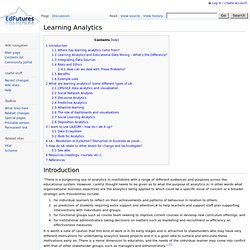
However, careful thought needs to be given as to what the purpose of analytics is; in other words what organisational business objectives are the analytics being applied to which could be a specific issue of concern or a broader strategic aim. SocialLearn Research Blog » Blog Archive » SoLAR Storm Event – Learning Analytics Symposium. KMi Podium, Level 4, Berrill Building, The Open University, Milton Keynes, UK [map] 1.25-4.30pm BST, Thursday 25 October 2012 [convert times] #StormSLA twitter archive, question archive, and visualization (thanks Martin Hawksey)
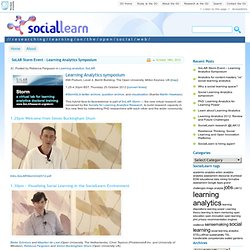
ECAR Study of Undergraduate Students and Information Technology, 2012. Learning Analytics: Leveraging Education Data [Infographic] Improving Retention by Identifying and Supporting "At-Risk" Students (EDUCAUSE Review) Annika Wolff is a Research Associate and Zdenek Zdrahal is a Senior Research Fellow at the Knowledge Media Institute, The Open University.
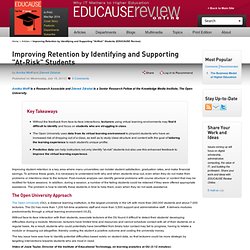
Key Takeaways Without the feedback from face-to-face interactions, lecturers using virtual learning environments may find it difficult to identify and focus on students who are struggling in class. The Open University uses data from its virtual learning environment to pinpoint students who have an increased risk of dropping out of a class, as well as to study class structure and content with the goal of tailoring the learning experience to each student's unique profile. Student Experience Traffic Lighting - Engagement Analytics. Improving student success using predictive models and data visualisations. Research in Learning Technology Supplement: ALT-C 2012 Conference Proceedings Alfred Essa* and Hanan Ayad Desire2Learn Inc, Kitchener, Canada (Received 12 March 2012; final version revised 13 June 2012; Published: 30 August 2012) Abstract The need to educate a competitive workforce is a global problem.
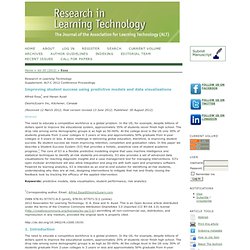
Keywords: predictive models, data visualisation, student performance, risk analytics *Corresponding author. Who's Reading Your Research? Academia.edu Offers an Analytics Dashboard For Scholars. Cross-posted on Inside Higher Ed Academia.edu, a social network for scholars, is unveiling a new feature today that its founder Richard Price hopes will help address part of the “credit gap” for research.

Academia.edu allows users to upload and share their research papers, and the site is launching its Analytics Dashboard for Scientists today that Price says will let scholars see the “real-time impact” of their work. Academic publishing has long been a black-box in terms of both who’s reading and who’s citing. Publishing in journals may be expected (required, even), but the delays in the publishing process can make it challenging to ascertain how much influence work has. “It typically takes about 3 to 5 years for citations to actually appear back in the process,” argues Price, pointing to the lengthy time between researching, writing, peer-reviewing, and publishing.
That’s part of the problem with services like Google Scholar that do offer citation counts, Price contends. Project fulCRM. Can better data keep students from dropping out of college? Headlines One of the biggest challenges to college education in the United States is the staggering number of students who don’t, in the end, earn degrees.
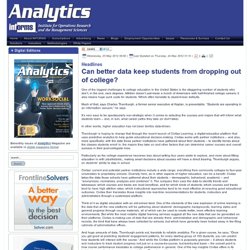
Attrition doesn’t just mean a bunch of Americans with half-finished college careers; it also means huge sunk costs for students. Which often translate to student-loan defaults. Much of that, says Charles Thornburgh, a former senior executive at Kaplan, is preventable. Publications. The growth of social media poses a dilemma for security and law enforcement agencies.
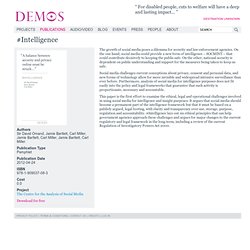
On the one hand, social media could provide a new form of intelligence – SOCMINT – that could contribute decisively to keeping the public safe. On the other, national security is dependent on public understanding and support for the measures being taken to keep us safe. Social media challenges current conceptions about privacy, consent and personal data, and new forms of technology allow for more invisible and widespread intrusive surveillance than ever before. Furthermore, analysis of social media for intelligence purposes does not fit easily into the policy and legal frameworks that guarantee that such activity is proportionate, necessary and accountable. This paper is the first effort to examine the ethical, legal and operational challenges involved in using social media for intelligence and insight purposes. Technology that Transforms Data into Performance.
Data Protection Law and the Ethical Use of Analytics : : Privacy and Information Security Law Blog. Information Dashboard Design - Stephen Few. EDM-LA-Brief-Draft_4_10_12c. The Internet and Higher Education - Classroom walls that talk: Using online course activity data of successful students to raise self-awareness of underperforming peers. Volume 14, Issue 2, March 2011, Pages 89–97 Web mining and higher education: Introduction to the special issue Edited By Rafi Nachmias Abstract Similar to other institutions, the University of Maryland, Baltimore County (UMBC) has determined that a relationship may exist between student performance as defined by grades, and activity in the campus' online course management system (CMS).
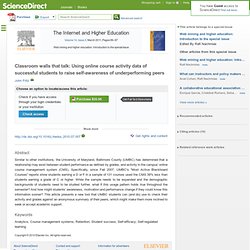
Specifically, since Fall 2007, UMBC's “Most Active Blackboard Courses” reports show students earning a D or F in a sample of 131 courses used the CMS 39% less than students earning a grade of C or higher. "Utilizing student data within the course management system to determin" by John Patrick Campbell. John Patrick Campbell, Purdue University Abstract For nearly six decades, researchers have been studying the issues of student persistence and retention in higher education.
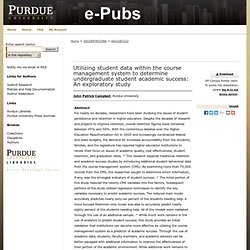
Despite the decades of research and projects to improve retention, overall retention figures have remained between 45% and 50%. With the contentious debates over the Higher Education Reauthorization Act in 2005 and increasingly constrained federal and state budgets, the demand for increased accountability from the students, families, and the legislature has required higher education institutions to renew their focus on issues of academic quality, cost effectiveness, student retention, and graduation rates. ^ This research expands traditional retention and academic success studies by introducing additional student behavioral data from the course management system (CMS). Transformative leadership. SocialLearn Research Blog » Blog Archive » PhD: Learning Analytics for Learning Power.
Learning Analytics for Learning Power Knowledge Media Institute, The Open University, Milton Keynes, UK3 year fully-funded PhD (Oct. 2012-Sept.2015), Stipend: £40,770 (£13,590/year) Supervisors: Simon Buckingham Shum & Rebecca Ferguson Background Intrinsic motivation to engage in learning (whether formal/informal, or academic/workplace) is known to be a function of a learner’s dispositions towards learning.
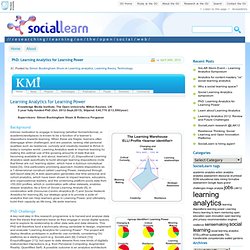
When these are fragile, learners often disengage when challenged, and are passive, lacking vital personal qualities such as resilience, curiosity and creativity needed to thrive in today’s complex world. PhD Challenge. UvA Analytics kick off - Artikel - SURFspace. SURFspace vraagt jouw toestemming om cookies te gebruiken. Home - Learning Analytics - SURFwiki. Isaac Asimov Imagines Learning in the Digital Age … and Gets It Quite Right (1989) Management Information. Desire2Learn moving to ‘predictive analytics’ with IBM. Internet Community Text Analyzer. Learning analytics: Starvation and telling us what we already know. This article from Inside Higher Ed reports on some initial findings from the Gates Foundation data mining project in the US.
The key finding reported in the article is. The Indicators Project. “Here I stand” – Campbell’s concerns on analytics and other stuff. Continuing a re-engagement with analytics I spent some time listening to Gardner Campbell’s talk to the LAK’12 MOOC – Here I Stand and from there followed various links. Yammer Announces Analytics Suite To Manage Your Network. Yammer, a company that has Twitter-like properties to assist companies to create better communication throughout its ranks, has launched a new dashboard analytics tool which gives employees a deeper look into what’s happening in their network.
The tool is supposed to help employers understand who is using the tool and how they’re using it. It appears that the addition of analytics helps prove out the return on investment for using Yammer in the first place. Here’s what Yammer CEO David Sacks had to say about the release today: By giving our customers access to powerful analytics, we are helping them better understand their networks, revealing potential for growth and demonstrating how Yammer can transform their organizations. We are dedicated to our customers’ success and these tools are empowering employees by providing valuable insight on the overall health of the network and which areas to drive further adoption.
Open Learning Analytics. On the reductionism of analytics in education. I had the great pleasure (and distinct discomfort) of listening to Virginia Tech’s Gardner Campbell speak on learning analytics this week, through my haphazard participation in the Learning Analytics 2012 MOOC. Haphazard, I say, because I am so busy at work I can hardly spare any time to connect outside of it, whether through more structured means like the Learning Analytics course or less structured like Twitter and Facebook. Discomfort, I say, because Campbell launched some pointed criticisms of the current reductionist approach to learning analytics that prevails in education today.
Yes, it prevails at Pearson too, not because we have bad motives, but because the process of education and learning is so complex that we feel compelled to simplify it in some way to make any sense of it. M-theory vs. the x-y plane Campbell drew an analogy to cosmology, contrasting 11-dimensional m-theory with the planar (two-dimensional) Cartesian coordinate system.
The math is not the territory. Analytics in Higher Education: Establishing a Common Language. Reflections on the Knowledge Society » The twinning of EDM and Learning Analytics. After listening to Ryan Baker’s presentation on Educational Data Mining (EDM), I am more convinced than ever that EDM and Learning Analytics are actually the same side of the same coin. Despite attempts being made to explain them into different zones of influence or different missions, I fail to see such differences, and from reading other LAK12 participants’ reflections, I am not alone in this. Baker’s view that Learning Analytics are somewhat more “holistic” can be refuted with a simple “depends”. What is more, historically, EDM and LA don’t even originate from different scientific communities, such as is the case with metadata communties versus librarians, or with electric versus magnetic force physics – now of course known as electromagnetism.
Both approaches (if there are indeed two) are based on examining datasets to find ‘invisible’ patterns that can be translated into information useful to improve the success and efficiency of the learning processes. HTML5 Please - Use the new and shiny responsibly. Search. A 'Moneyball' Approach to College - Technology. By Marc Parry Cambridge, Mass. A 'Moneyball' Approach to College - Technology. By Marc Parry Cambridge, Mass.
Open Learning Analytics: A proposal. Women's Heel Size Drops, Thanks to IBM Analytics. Back when kids played outdoors in playgrounds, there was some taunt about acting your age not your shoe size. Well, IBM has managed to figure out that the median shoe heel height for women has been dropping for the fashion conscious, quite precipitately it seems over the past couple of years. Supporting Learners with Activity Data. Assessment and Analytics in Institutional Transformation (EDUCAUSE Review. Freeman A. Hrabowski III (hrabowski@umbc.edu) is President of the University of Maryland, Baltimore County (UMBC).
Jack Suess (Jack@umbc.edu) is Vice President, Information Technology, and CIO at UMBC. John Fritz (fritz@umbc.edu) is Assistant Vice President, Instructional Technology & New Media, at UMBC. Comments on this article can be posted to the web via the link at the bottom of this page. Penetrating the Fog: Analytics in Learning and Education (EDUCAUSE Review. George Siemens (gsiemens@gmail.com) is with the Technology Enhanced Knowledge Research Institute at Athabasca University. Phil Long (longpd@uq.edu.au) is a Professor in the Schools of ITEE and Psychology and is Director of the Centre for Educational Innovation & Technology at the University of Queensland. KMi Podium. Reflections on the Knowledge Society » Pedagogy and the Learning Analytics model.
Knowledge Media Institute. d8taplex. Learning and Knowledge Analytics. Learning Analytics: CAL 2011. The value of analytics in an educational and learning context. The Netflix Effect: When Software Suggests Students' Courses - Technology. Best Web Analytics Tools: Quantitative, Qualitative, Life Saving! Comment on Sheila's Blog. Blog Archive » A Taxonomy of Data Science. The # LAK11 Daily. LAK11 (3) Search - LAK11. Learning & Knowledge Analytics. Course: Learning and Knowledge Analytics. Learning & Knowledge Analytics 2011 (1424)
Learning and Knowledge Analytics. Thoughts so far on LAK11. How can statistics of their performance help students to improve and how should these statistics be represented to students. Best content in Learning Analytics. MOOC newbie Voice – Week 2 Big Data… must be important… it’s big! Social Networks in Action - Learning Networks @ UOW. FinalReport - Social Web XG Wiki.